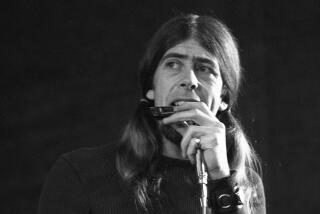Jazz fusion guitarist Larry Coryell dies at 73
- Share via
Jazz guitarist Larry Coryell, known as the “Godfather of Fusion,” has died in New York City. He was 73.
His publicist, Kurt Nishimura, said Coryell died Sunday in his hotel room of natural causes. Nishimura says he had just performed two shows at the Iridium on Friday and Saturday.
Coryell’s highly influential album “Spaces,” recorded in 1969, has long been considered one of the pillars of the jazz-rock fusion movement that soon followed. He stood out whether performing fusion, bebop and post-bop, or any number of jazz styles in between.
The versatile guitarist recorded more than 60 albums under his name. He recorded a good number more with such jazz legends as Miles Davis, Charles Mingus, Chico Hamilton, Gary Burton, Chet Baker, Stéphane Grappelli and such fellow guitar greats as John McLaughlin, Paco de Lucía, Al DiMeola, John Abercrombie, Charlie Byrd, Sharon Isbin, Laurindo Almeida and Philip Catherine.
Coryell’s classic 1971 song, “The Great Escape,” was sampled several decades later by the Los Angeles hip-hop group Jurassic 5. Other Coryell songs were sampled by everyone from Biz Markie and Dr. Octagon to Cornershop and Aceyalone.
It was while playing with Hamilton and Burton in the 1960s that Coryell rose to prominence. His stunning combination of virtuosity, sophistication and youthful daring had a big effect on other guitarists, including the young Pat Metheny.
Coryell was born April 2, 1943, in Galveston, Texas, and grew up near Seattle. He began to play piano when he was 4, then moved to the guitar. He was a journalism major at the University of Washington before moving to New York in the 1960s and devoting himself full time to music.
Coryell was comfortable in any stylistic setting, from jazz and Indian classical music to rock and blues. In 1975, he sat in with Eric Clapton at a concert in London’s Hyde Park and promptly stole the show.
“I had someone once tell me that they liked my music, but they liked the person I was more,” Coryell told Florida Today in a 2014 interview.
“That made my day and was the best compliment, because I was more than my music. The human being we are is what is most important and it is the people we are that make a difference and allow us to live peacefully.
“I am fortunate to play music and I realized a long time ago that if you have a talent, you actually have to work harder at things. I teach my students that. Because if you have a natural talent it requires you to dig deep into it and understand the elements, know the basics, and know that indelible concept known as ‘taste.’”
Before he could live peacefully, Coryell had to overcome his own drug and alcohol problems, he acknowledged in a 2016 interview with the French newspaper Herald de Paris.
“Well, the temptations of the music industry is a misnomer for me, because you have substance abuse problems all throughout society,” Coryell said.
“The disease of addiction can hit the local grocery clerk just as badly as it can hit a guitar player. For me, the best thing that ever happened to me was getting clean and sober. I still go to meetings.... I was able to overcome my substance abuse problem by getting professional help and I strongly recommend that for anyone who thinks they have a problem.”
His quest for clarity began several decades earlier.
“It’s essential to stay aware,” Coryell said in a 1986 San Diego Union-Tribune interview. “I do what I can to identify with youthful enthusiasm, but I also try to pass on some human dignity. That balance is very important. It’s essential.”
Coryell performed his last two shows on Friday and Saturday in New York City at the Iridium, the same Times Square club where guitar pioneer Les Paul for years performed every Monday night.
What may be Coryell’s final album, “Seven Secrets” — recorded with a revamped edition of his early 1970s fusion band the Eleventh House — is due for release on June 2.
He is survived by his wife, Tracey, daughters Annie and Allegra, guitarist sons Murali and Julian, and six grandchildren.
Varga writes for the San Diego Union Tribune
ALSO
‘Funky Drummer’ Clyde Stubblefield, whose 1970 solo was widely sampled in hip-hop, dies at 73
Bobby Freeman, San Francisco’s first rock star with ‘Do You Want to Dance,’ dies at 76
Influential jazz artist Al Jarreau, singer of ‘We’re in This Love Together,’ dead at 76
More to Read
Start your day right
Sign up for Essential California for the L.A. Times biggest news, features and recommendations in your inbox six days a week.
You may occasionally receive promotional content from the Los Angeles Times.






